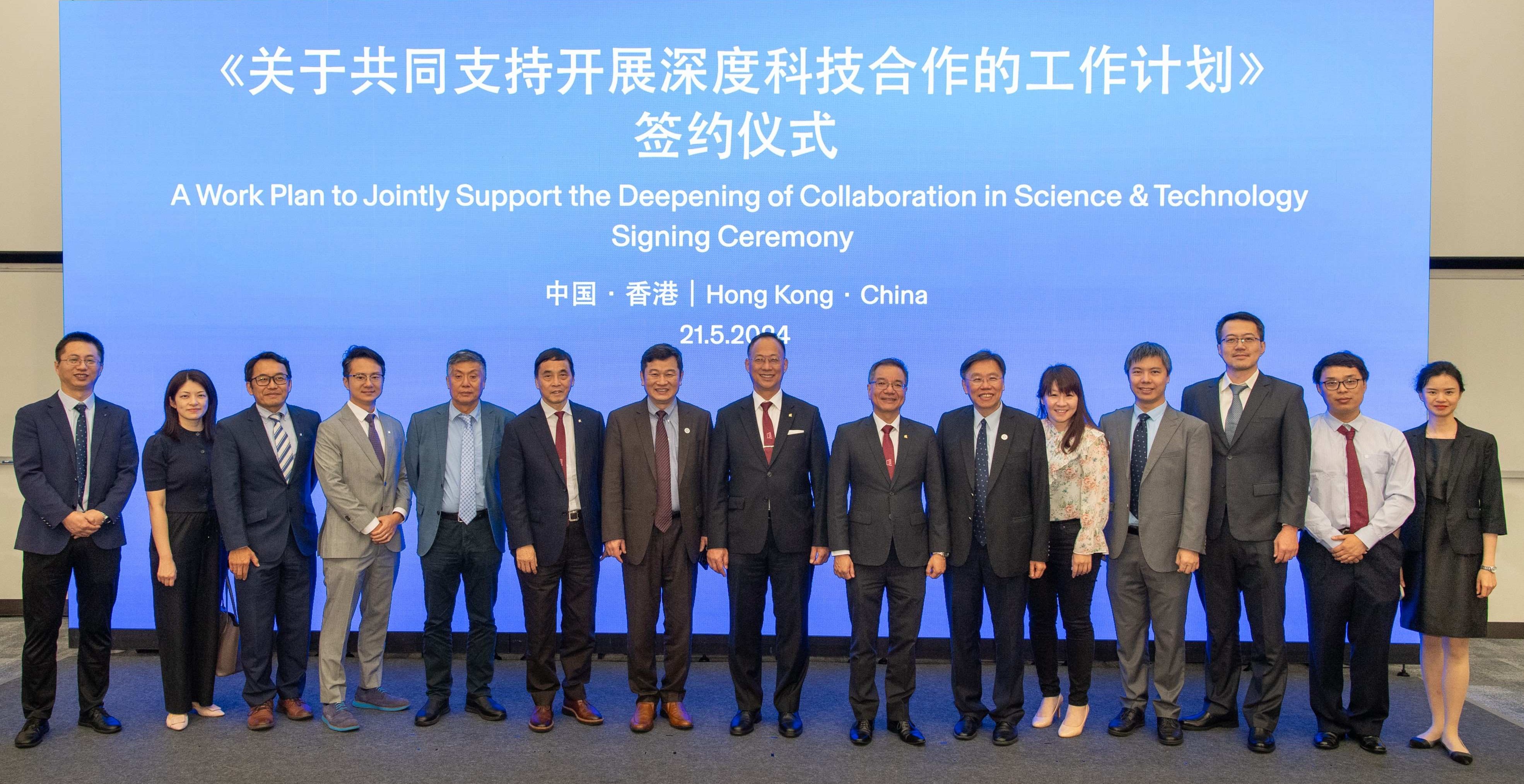News


Department of Science and Technology of Guangdong Province, HKBU and BNU-HKBU UIC jointly establish seed fund for scientific research
21 May, 2024
The Department of Science and Technology of Guangdong Province (GDSTC), Hong Kong Baptist University (HKBU), and Beijing Normal University-Hong Kong Baptist University United International College (BNU-HKBU UIC) signed a collaboration agreement on 21 May to provide joint support to in-depth scientific and technological cooperation. The three parties will establish a seed fund pool amounting to HK$90 million to conduct in-depth science and technology research projects and strengthen cooperation in areas of research infrastructure and talent training.
During the signing ceremony, Mr Gong Guoping, Party Secretary of GDSTC, introduced the “Work Plan to Jointly Support the Deepening of Collaboration in Science & Technology.” The Work Plan aims to accelerate the development of the Guangdong-Hong Kong-Macao Greater Bay Area (GBA) as an international science and technology innovation centre, and to leverage the advantages of Hong Kong higher education institutions and their joint institutions in Guangdong. The Plan also supports more in-depth collaborations between cross-campus teams in science and technology, encourages active participation in national scientific and technological programmes, and promotes original and innovative joint research projects. These initiatives are in order to enhance the breadth and depth of research projects in the regions and address the key technology needs of the Nation and the GBA.
Mr Gong, together with Professor Alex Wai, President and Vice-Chancellor of HKBU, and Professor Chen Zhi, President of BNU-HKBU UIC, signed the collaboration agreement, which marks a new milestone in research collaboration between Guangdong and Hong Kong. The ceremony was witnessed by Mr Wang Xi, Member of the Standing Committee of the Guangdong Provincial Party Committee and Vice Governor; Mr Huang Mingzhong, Deputy Secretary-General of the Guangdong Provincial People’s Government; Mr Zhu Kongjun, Director-General of the Guangdong Provincial Department of Education; and Ms Long Guangyan, Deputy Director of Hong Kong and Macao Affairs Office of Guangdong Province.
Under the Work Plan, the three parties will implement a “1+1+1” Funding Programme. Over the three-year period from 2024 to 2026, GDSTC will invest RMB10 million per year, while HKBU and BNU-HKBU UIC will invest no less than HK$10 million and RMB10 million respectively per year as seed funding for scientific research. The fund will support up to 10 joint research teams and projects each year, particularly in strategic areas of data science, artificial intelligence, and interdisciplinary applications.
Furthermore, the Plan encourages the establishment of innovation platforms and Guangdong-Hong Kong-Macao joint laboratories, as well as actively promotes international science and technology as well as talent collaborations. The three parties will also host joint seminars and academic conferences.
Professor Alex Wai, President and Vice-Chancellor of HKBU, expressed his thanks for the support and trust bestowed by the GDSTC. He said: “HKBU is committed to advancing scientific research with a strong emphasis on translating research outcomes for the benefits of society. This collaboration successfully integrates the resources and strengths of Guangdong and Hong Kong, and leverages the strategic positioning of 'One University, Two Campuses' of HKBU and BNU-HKBU UIC. It will facilitate more innovative joint projects of great scientific value and spark transdisciplinary innovations and technology translation. We look forward to the nurturing of more groundbreaking innovations and applications in the near future with contributions to Hong Kong, the GBA and the Nation.”
Professor Chen Zhi, President of BNU-HKBU UIC, said: “HKBU is the first Hong Kong university to establish a collaborative campus in the Mainland. BNU-HKBU UIC, jointly established by HKBU and Beijing Normal University, has now grown to a considerable scale with more than 9,000 students. The staunch support of the GDSTC will advance the collaboration between HKBU and BNU-HKBU UIC to new heights. We will explore innovations in areas such as novel technologies, talent and academic discipline developments in support of the Nation’s development strategies, and contribute to the integration of the GBA and its innovation development.”